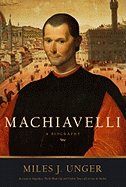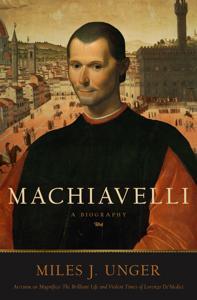
 Niccolò Machiavelli (1469-1527) was labeled "the finger of Satan" by a prominent Cardinal in 1539 and his work was placed, as one of the first, on the Papal Index of Prohibited Books in 1559. Achieving such notoriety is no mean feat, and Miles Unger chronicles the twists and turns of Machiavelli's life with the same flair that he brought to Magnifico: The Brilliant Life and Violent Times of Lorenzo de' Medici. As Machiavelli treads his path--humble beginnings in Florence; crucial years in the bureaucracy of the city's government; emergence as author of The Prince; posthumous vilification by the Church--we feel we are back in Renaissance Florence amid all its intrigue and tumult.
Niccolò Machiavelli (1469-1527) was labeled "the finger of Satan" by a prominent Cardinal in 1539 and his work was placed, as one of the first, on the Papal Index of Prohibited Books in 1559. Achieving such notoriety is no mean feat, and Miles Unger chronicles the twists and turns of Machiavelli's life with the same flair that he brought to Magnifico: The Brilliant Life and Violent Times of Lorenzo de' Medici. As Machiavelli treads his path--humble beginnings in Florence; crucial years in the bureaucracy of the city's government; emergence as author of The Prince; posthumous vilification by the Church--we feel we are back in Renaissance Florence amid all its intrigue and tumult.
As Florence's Second Chancellor, Machiavelli observed the way his city, its allies and its enemies operated in crisis after crisis. The abstract principles of statecraft espoused by philosophers like Socrates, Plato and Aristotle played little part in the pitched battles between competing groups and individuals that he saw. That experience formed the basis of his pragmatic view of the way a real-world state survives and prospers; the evidence inspired him to develop his revolutionary profile of a great leader. He was candid to a fault when he wrote The Prince, sharing everything he had learned with the Medici coming in to govern Florence, with the hope that they would be grateful and offer him a new job. The Medici dismissed him as a nuisance and, as Unger wittily remarks, The Prince has achieved fame as perhaps the most unsuccessful job application of genius of all time.
"A lie, convincingly told, is among the most powerful weapon in the ruler's arsenal," Unger writes as he tells us that Machiavelli did not follow his own tips for rulers. Machiavelli, expecting that his insights would win him patrons and employment, was sorely disappointed, Unger tells us. "Pointing out uncomfortable truths turned out to be an unpardonable crime, while countless acts of cruelty, treachery, and violence... were passed over with barely a yawn." Machiavelli should have known what would happen to him for speaking so plainly to the Medici, but could he have had imagined he'd be influential for centuries? Cynic that he was, he'd have laughed and asked how much his monetary award was.--John McFarland
Shelf Talker: A highly engaging, authoritative biography of Machiavelli, who rose to become a world-famous author, founder of modern political science and vilified by the Catholic Church as the finger of Satan--not bad for an underpaid government clerk in Renaissance Florence.

